Over 20 students from the Indigenous Scholars Organization staged a 24-hour long protest outside of Rand Dining Hall to raise attention to issues faced by Indigenous students, to commemorate Indigenous People’s Day and to advocate for an official university land acknowledgment. A university representative stated in an Oct. 11 message to The Hustler that Vanderbilt does not currently plan to adopt a land acknowledgment.
Protestors hung a banner reading, “Indigenous Justice Now! Hold Vanderbilt Accountable for Stolen Land.” The demonstration started at 12:30 p.m. CDT on Oct. 10 and ended at 12:30 p.m. CDT the next day.
During the protest, ISO circulated a Indigenous People’s Day Coalition Statement and petition via email to five administrators including Chancellor Daniel Diermier, Dean of Ingram Commons Melissa Gresalfi and Dean of Students G.L. Black. Per ISO co-president and second-year graduate student Dante Reyna, ISO has not received a response to their petition as of print.
The statement details six demands from ISO to the university, the first of which is for the university to pass a land acknowledgment. In an Oct. 11 statement to The Hustler, the university stated that it would not endorse an official land acknowledgment due to “legal implications,” but did not respond to The Hustler’s inquiry about specific concerns.
“Vanderbilt community members who make land acknowledgments do not speak for the university,” the university statement reads.
Indigenous People’s Day Coalition Statement
As of print, 221 students, alumni and community members have signed ISO’s statement and petition. Per Reyna, ISO has advocated for the university to adopt a land acknowledgment for nearly four years.
“A land acknowledgment is simply the bare minimum that the university can do to address Indigenous issues,” Reyna said. “In addition to that, the quality of life, and especially the quality of student life, is substantially worse for Indigenous people.”
In September 2019, VSG passed the Indigenous People’s Day and Land Recognition Bill, affirming its support of the university adopting a land acknowledgment and reading it at major school events. A resolution asking the university to adopt a land acknowledgment—which was written by ISO—was brought forward to the Faculty Senate in January 2021. The Senate voted to recommit it to its Diversity, Equity and Inclusion committee.
“The Faculty Senate, through its committee structure, continues to consider issues of importance to the faculty in the shared governance model in which we participate,” current Faculty Senate Chair Rebecca Swan said in an Oct. 13 message to The Hustler.
The second demand listed on the petition asks the university to create a designated space on campus for Indigenous students to “gather, celebrate and rest.” Reyna pointed to the small percentage of Native American students—0.4% of the campus population—as a reason for a campus center.
“Indigenous people flourish in their own spaces,” Reyna said. “An Indigenous space would provide us an avenue in order to feel like ourselves and for us to practice our traditions and ceremonies in a safe place.”
Other demands include for the university to establish an Indigenous Studies major and minor led by Indigenous faculty and to create an orientation program educating incoming undergraduates about the history and current issues faced by Native Americans in Tennessee. ISO added that the university should “make space” for more on-campus leadership opportunities for Indigenous students and faculty.
The petition also calls for the university to enforce rules preventing non-Indigenous faculty from “keeping and maligning” Indigenous artifacts. In 2007, a then-graduate student filed a lawsuit against anthropology professor Arthur Demarest, in part accusing him of “destruction of artifacts” while on a dig site in Guatemala. The parties reached a confidential settlement in 2008. Demarest told The Hustler that the lawsuit’s accusations are false, and all of the artifacts that he owns are replicas or gifts given to him by Indigenous communities.
Department of Anthropology Chair Beth Conklin stated in a message to The Hustler that the department, which houses a substantial amount of Indigenous artifacts at Vanderbilt, “has a deep commitment to ethical stewardship of Native American ancestral remains and belongings housed on campus.” Per Conklin, the department repatriated ancestral remains to the Chickasaw Nation in 2019 and is housing remaining Native American ancestral remains and belongings in “locked locations out of sight” as it continues the repatriation process.
“We are in the early stages of reimagining new and innovative approaches to supporting all Vanderbilt community members’ identities with the goal of strengthening a sense of belonging for everyone at the university,” the university stated in its Oct. 11 message to The Hustler. “We will be working through this process in close collaboration with Vanderbilt Student Government and the Faculty Senate beginning later this fall.”
Protest
During the protest, a group of approximately 20 ISO members and student volunteers took shifts guarding the banner that they had hung outside of Rand. Six students stayed outside throughout the night.
Sophomore Shalini Thinakaran, who took part in the demonstration, called it an “homage” to a similar protest organized by ISO and the African Student Union last year in March. In response to a Chabad speaker event, ISO and ASU hung a banner outside Rand, which was taken down by Black due to it not being attributed to a student organization. Organizers then put up another banner and guarded it overnight.
Per ISO co-president and junior Annabelle Littlejohn-Bailey, the organizers hoped to place pressure on the university to generate broader support for ISO’s demands. Littlejohn-Bailey is a staff writer for The Hustler.
“We want to push for an Indigenous community that has a voice and feels that it can go through the normal process of appealing to our administration and appealing to professors, but we feel that all of those normal processes so far have led us to nothing,” Littlejohn-Bailey said. “People aren’t listening to us, so we’re taking alternative steps to make sure that our community is recognized and has power within these processes.”
The Indigenous People’s Day protest concluded with a speech by Reyna to a group of gathered student organizers and onlookers.
“It is our job to shed light on the history that came before us and for all those whose light was extinguished,” Reyna said. “We are eternal visitors to this land and must work with indigenous people to illuminate the way for those lost and, more importantly, make sure that what was lost is never lost again.”


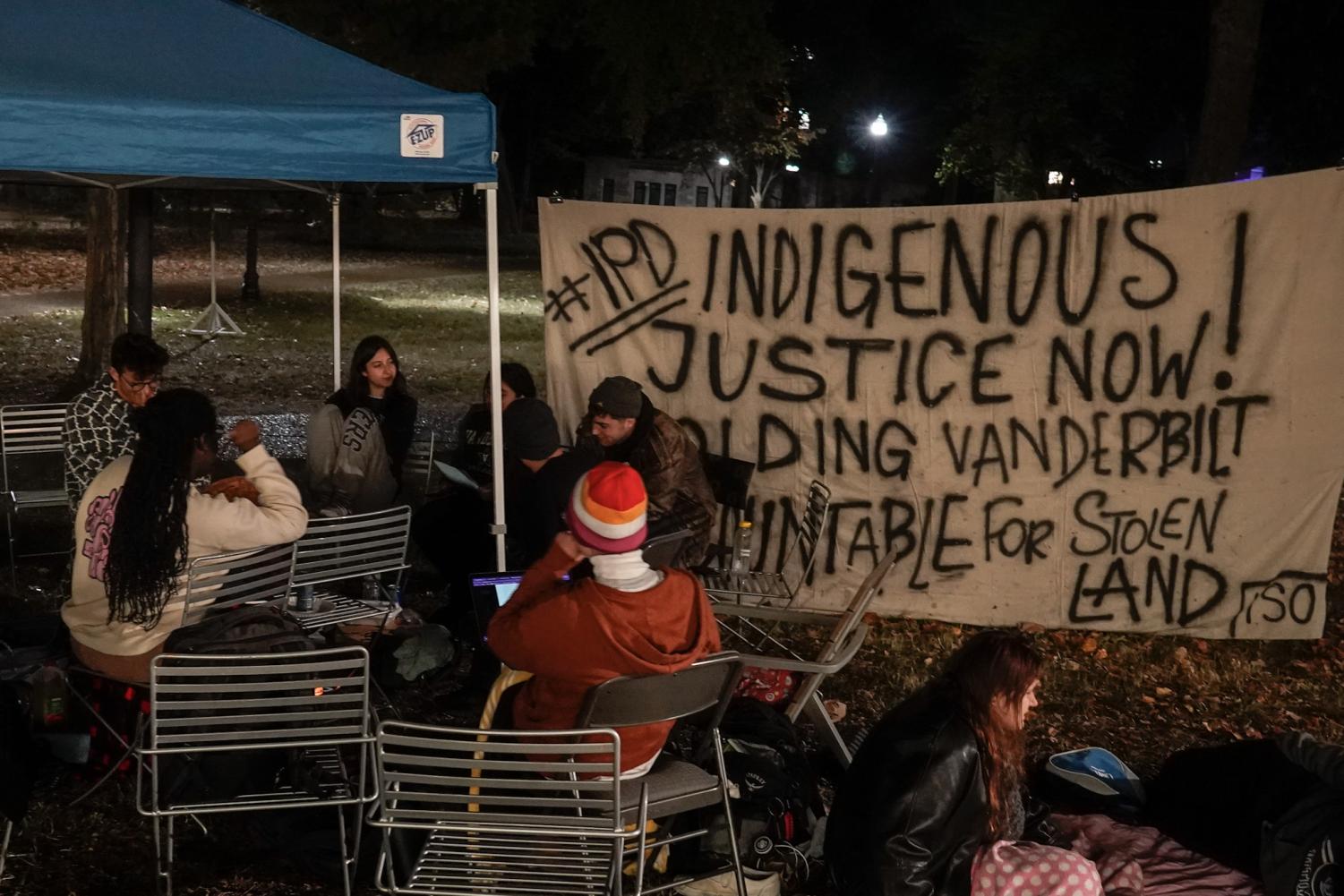

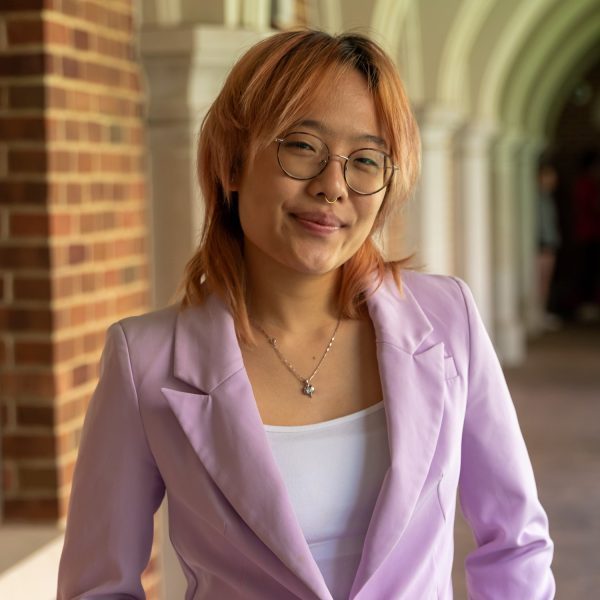
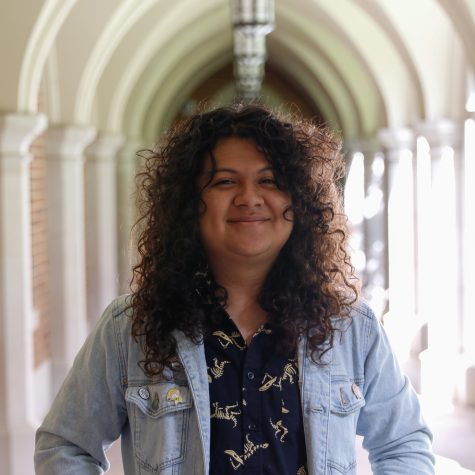
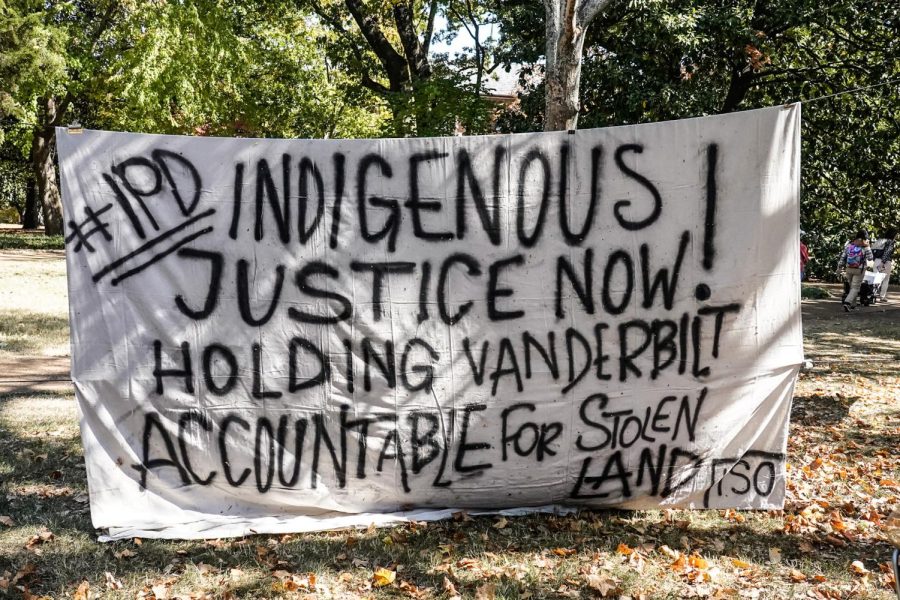
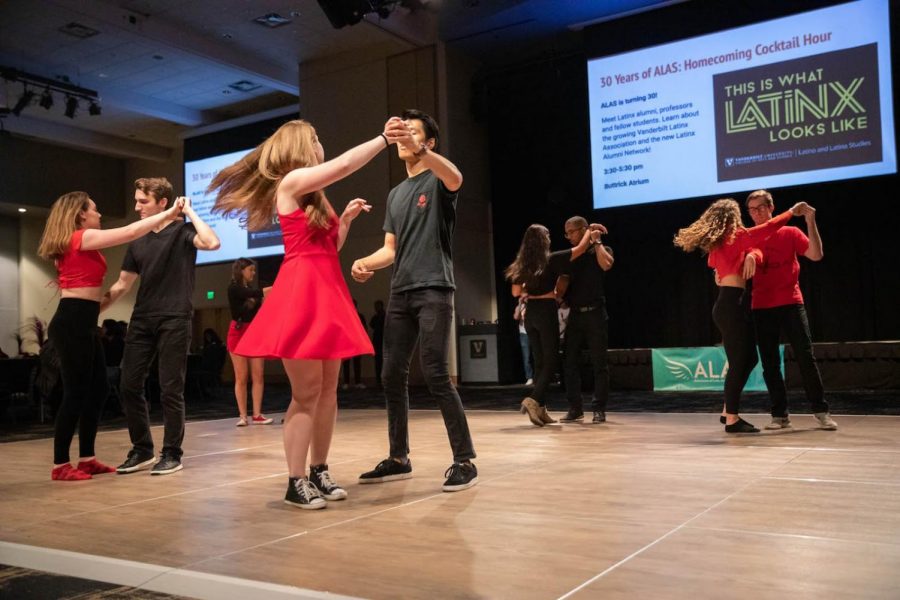
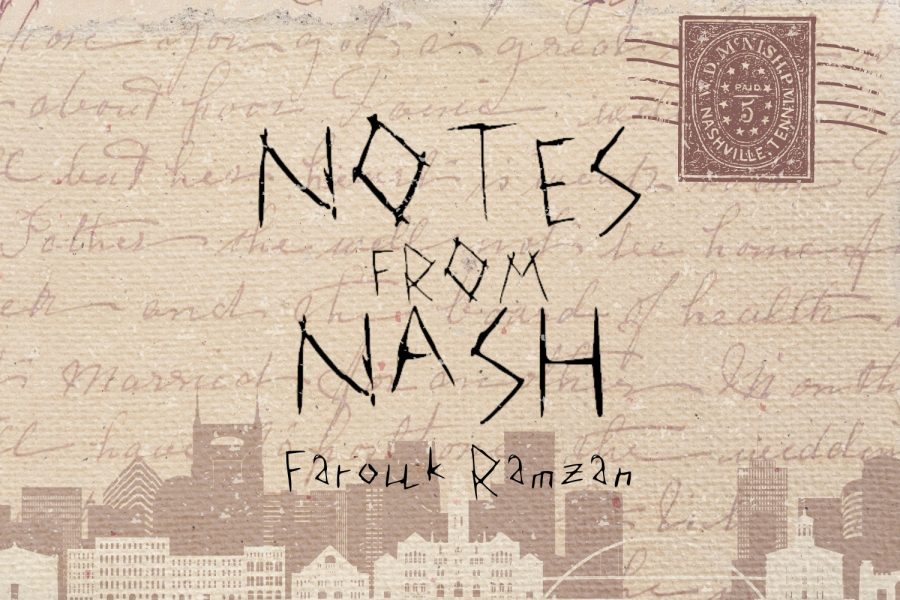
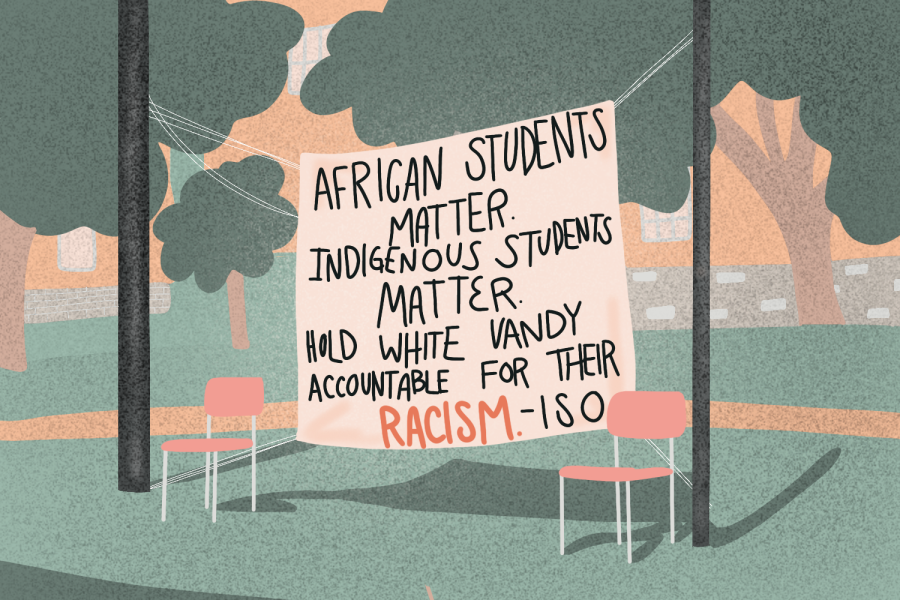
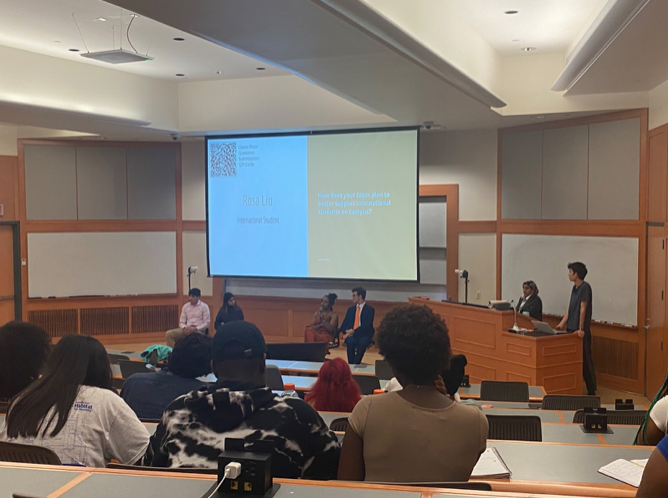
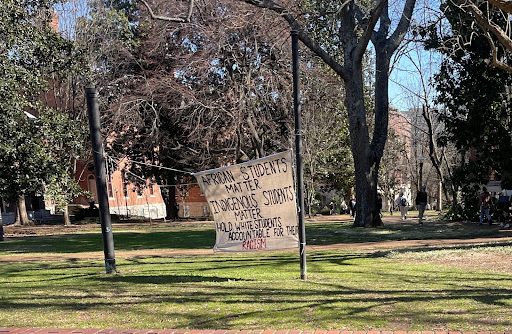
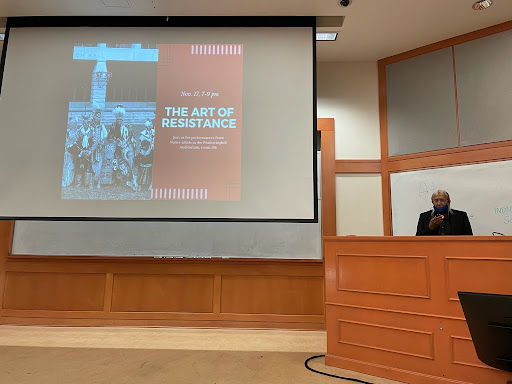
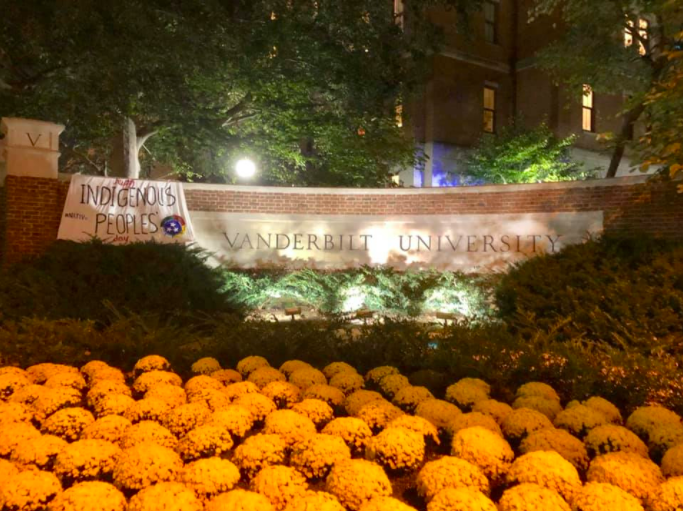
Joe • Mar 27, 2023 at 3:27 pm CDT
Perhaps ISO believes indigenous quality of life is lower than others BECAUSE they aren’t given greater rights than overall student body and because the school does not acknowledge that the land where the university sits should be handed over to the indigenous community?
Anonymous • Oct 18, 2022 at 5:40 am CDT
I defer to a “Student’s” comment above. Can someone from the ISO please clarify how the quality of student life is substantially worse for Indigenous people? I say this because if ANY student, regardless of his/her indigenous status, is being mistreated by VU, then clearly the issue should be addressed.
Based on the published enrollment statistics of students attending Vanderbilt University, last year there were fewer than one half of one percent of all students (graduate and undergraduate) who identify as indigenous – approximately 46 students. With such a small number of students identifying as indigenous it does not seem prudent to designate a separate area of campus for the exclusive use of 46 students. Next will you propose that individuals segregate themselves based on their state of origin or their hair or eye color?
While in theory we would all like to acknowledge our ancestral heritage, we must be mindful that America is a melting pot. We all celebrate varied ancestries. I dare say VU possesses enough land to designate areas for exclusive use by students of every “geo-ethnic” variation represented in the study body.
Sadly the world is not utopia nor will it ever be. Perhaps you change your outlook. Rather than seeking to increase exclusivity by focusing on the differences; instead you could choose to see the prideful unity in your role as a Vanderbilt Commodore.
Student • Oct 17, 2022 at 10:16 am CDT
“In addition to that, the quality of life, and especially the quality of student life, is substantially worse for Indigenous people.”
I am not saying this is not true, but would love explanation / evidence of this. Not sure if this is indigenous people in general / just at Vanderbilt and what the core factors are that drive this. Very large claim to make that deserves more attention. Please don’t read my comment as someone trying to tear this post down, but as someone trying to better understand this issue
current student • Oct 20, 2022 at 4:32 pm CDT
Only 18% of Native Americans are currently enrolled in higher education institutions across the United States, compared to the national average of 41%. Native students, especially those coming from tribal reservations or rural communities in Alaska, grow up in difficult conditions (lack of access to clean water, high crime rate, high rates of violence against Native women and children). Outside of academia, the quality of life Native youth experience, statistically, is harsh, and these are the conditions (in addition to most being first generation/low income students) they must overcome to reach a space like Vanderbilt.
Native students from these communities have a unique relationship to education, with many of their grandparents and parents being subjected to the Bureau of Indian Affairs (BIA) boarding schools. Surviving this historical context and making it to Vanderbilt University is impressive. However, speaking from experience myself, it can be doubly challenging to deal with difficult coursework, and, to feel like my identity and experiences and widely understood and ignored by my own college community. It is hard when my classmates will make offensive comments about tribal communities (i.e. calling reservations third-world countries). I wish I had Indigenous mentors or faculty that looked like me but there are none. Vanderbilt doesn’t even recognize our history as Native peoples.
Jessica VU 95 • Oct 14, 2022 at 7:29 am CDT
The Indians stole the land from the deer, birds, and cattle. When will they acknowledge this?
What kind of job skills would an indigenous studies graduate have? How would that person gain meaningful employment that would pay down their student debt? You are better off with an economics, engineering, or science degree than a woke major.
Also, why the need for all these “safe spaces”. The student body need to assimilate, not segregate.
Audrey • Oct 14, 2022 at 12:43 pm CDT
Please do not speak on things you do not understand. Indigenous peoples respect land and it’s inhabitants.
Jessica, an Indigenous Studies graduate would most likely go into research. They would gain the same skills as a history major, as this degree is like a history major, except extremely concentrated in Indigenous history. This is very common. Would you say a Law, History, and Society major is useless? These are the same concepts one would learn in an Indigenous Studies degree, except, again, with a focus on Indigenous history. Our traditional curriculum does not account for Indigenous Studies right now, so we have to advocate for it.
As for a safe space, it is very common for disenfranchised people to have spaces for just themselves on campus. Obviously people want to be around those of their same culture in a space guaranteed to not be racist. No one is segregating.
Dan • Oct 14, 2022 at 3:15 pm CDT
“Obviously people want to be around those of their same culture in a space guaranteed to not be racist. No one is segregating.” This is a contradiction.
The definition of segregation according to Merriam-Webster is “the separation or isolation of a race, class, or ethnic group by enforced or voluntary residence in a restricted area, by barriers to social intercourse, by separate educational facilities, or by other discriminatory means”.
“Safe spaces” meets the definition of segregation.
Vanderbilt is a place to interact with different individuals. Spending 4 years in a “safe place” is a waste of time. A student may graduate with a diploma, but won’t have an experience with that strategy.
Class of 2024 • Oct 18, 2022 at 9:49 am CDT
Hey Dan, I’m an Indigenous student in the class of 2024, and I’d like to elaborate on the concept of “safe spaces” for you.
Most of my time at Vanderbilt is spent around non-Indigenous students. I don’t know anyone else of my specific ethnic background on campus, and I’m involved in a lot of organizations across campus. When you consider classes, casual socialization, other organizations, and the random interactions that living in a dorm forces, 99% of my life is spent in the absence of Indigenous people. You can hardly call that segregation; in reality, it feels more like an aggressive form of isolation.
So here is where the idea of the safe space comes in. Most of my experiences at Vanderbilt, on a day-to-day basis, are fine. I love my friends, and regardless of their ethnic backgrounds they are mostly supportive of me as an Indigenous student. There are, however, semesters where you have a racist professor, or the guy that sits next to you in class calls Indigenous people “slaughterers,” and the everyday micro aggressions and disrespect build up so much as to become painful. The creation of a safe space guarantees that, even if the 99% of my time that I spend around non-Indigenous people has been shitty recently, I can count on that 1% being peaceful and restorative. For marginalized students, being able to take a break from the painful grind is very, very important.
It’s not as if, were we granted a space of our own, we would live there, eat there, take our classes there, and never leave. And you know that too—so please think before you speak.
Gen • Oct 14, 2022 at 8:49 pm CDT
Hi Jessica! Alum with an Econ degree who has “meaningful employment” at a bank here. I would have benefitted a lot from Indigenous studies courses to learn more about underbanked populations and impact of the US government holding Native land in trust on economic development. Thanks for the concern.
Melanie Bender • Oct 17, 2022 at 9:32 pm CDT
Give us some damn respect first before you open your smart aleck face… You’re on Indigenous territory! The first caretakers of the land! Mind your manners young person.